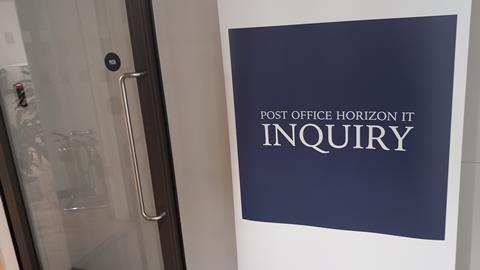After more than two years, the Post Office Inquiry hearings draw to a close with final statements from lawyers representing core participants
1.15pm: Moloney points out that even in the Bates judgment, the Post Office's legal team's strategy was so flawed that it was criticised by Mr Justice Fraser.
In summary, he tells the inquiry: 'Issues of independence, conflict and competence arise throughout the evidence of the legal professionals paid to support POL through this crisis. The inquiry might conclude that this evidence taken together makes a strong case for the more effective regulation of both professions. It may wish to call for a substantial change in the guidance that the SRA and BSB provide to solicitors and barristers on the dangers of losing independence.'
1.10pm: Moloney cites examples where lawyers were involved in the scandal. The Castleton litigation had 'nothing other than a vindication of Horizon to gain' and should have been settled. The response to litigation brought four years later by sub-postmasters saw the real 'doubling down' of the legal strategy which was as much a part of the defence of Horizon as the PR campaign.
Moloney criticises the 'smug triumphalism' of Post Office prosecutors, epitomised by the infamous email after the Misra trial from Jarnail Singh which said the court verdict should deter the 'Horizon-bashing bandwagon'.
Moloney adds that the treatment of expert evidence by lawyers was 'almost inconceivably poor'. The approach to disclosure was flawed and lawyers failed 'so often' with regard to their duties.
1pm: Moloney turns to the lawyers representing the Post Office, both external and in-house. He says they were supposed to show the requisite independent to 'rein in' the blinkered organisation.
'But this scandal, all too often, saw external and internal lawyers form an integral part of the robust defence of Horizon and the civil and criminal proceedings that were founded on its corrupt data.
'All too often lawyers were seen to fight a rearguard action for Post Office.'
12.55pm: Moloney addresses concerns about the investigations team at the Post Office and reminds the inquiry of how it had been put to one sub-postmistress during what was effectively a police interview that she should not have instructed solicitor Issy Hogg to represent her.
Moloney continues: 'Miss Hogg had first defended Jo Hamilton and went on to represent a number of other postmasters who raised concerns about Horizon when they were prosecuted. She believed in the postmasters' cause at a time when it was not a cause célèbre. She was plainly a thorn in the side of Post Office and that question [about her suitability to be instructed] should never have been asked.'
He adds: 'Miss Hogg died on 26 November this year after living with cancer for a long time and living every moment of what life was left to her to the full. We pay tribute to her courage and integrity.'
12.50pm: Moloney also wants to examine the actions of successive Post Office general counsel, Susan Crichton, Chris Aujard and Jane McLeod. Moloney reminds the inquiry that Vennells said she never knew the extent of information about the Horizon reliability, and suggests it is 'simply incredible' that the former chief executive never asked to be briefed on this topic. But he also says it is 'simply incredible' that none of the lawyers realised the importance of advice being received about the safety of witness evidence. He says this is at best 'one of the most egregious examples of reckless incompetence' by each of those involved.
12.40pm: Moloney, who is sat alongside high-profile former sub-postmistress Jo Hamilton, tells the inquiry there was an 'unblinking defence' of Horizon which caused so many of the problems, adding that 'it appears that individuals shut their eyes to information that didn't suit the narrative, or at worst they may have buried it'.
He moves on to the response to a lawyer's advice in 2013 that the key prosecution witness Gareth Jenkins was flawed. None of the internal or external lawyers shown this advice took the information to the board or the Criminal Cases Review Commission. Moloney adds: 'The advice should have been disclosed without delay. Instead the narrow focus of [external lawyers] Cartwright King and in turn the Post Office fell horribly short.'
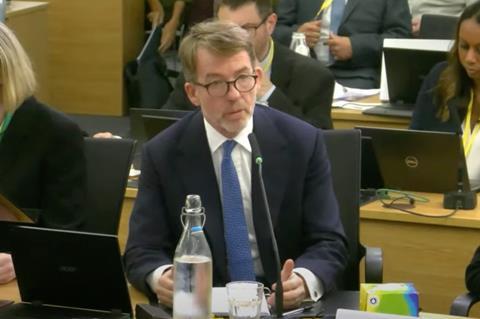
12.30pm: Tim Moloney KC, representing more than 60 sub-postmasters on behalf of Hudgells Solicitors, is now up.
12.20pm: Stein focuses on the failure by lawyers to ensure full disclosure when they appeared to know there were issues with the Horizon system. He points out that the external firm Cartwright King did not contact the police or do anything with regard to disclosing information.
'The failure was because by the point that [lawyers] were engaged they had become company men. In future no lawyer who has any part in the process of prosecution should ever be allowed to divorce their responsibilities in relation to prosecutorial duties and their advice to the entity that instructs them.'
Stein adds that his clients want the SRA and BSB to issue guidance that 'puts the prosecutorial duty first'.
He finishes with a tribute to the victims and their families, to the people who helped expose the scandal and to the inquiry team who have worked over the last three years.
12.10pm: Stein reveals that representatives from three law firms - Howe & Co, Hudgells and Hodge Jones and Allen - met with the Post Office last week to discuss potential compensation for a data leak during the summer, when personal and sensitive details for all 555 members of the Bates group litigation were leaked. Talks broke down over redress after three hours prompting claimant lawyers to collectively walk out of talks. Stein says victims simply do not trust Post Office to negotiate in good faith.
11.55am: Stein says one of the key questions that victims want to be answered is where their money has gone. This is money that they themselves put in to balance shortfalls created by the Horizon system. In some cases people had to beg family members for help in plugging shortfalls. We now know that these shortfalls were not real, effectively meaning the Post Office was receiving the money and never paid it back. Stein says there is at least £37m unaccounted for that the Post Office received.
11.50am: After a short break, Sam Stein KC, instructed by Howe & Co, addresses the inquiry. He lists the likes of Vennells, former executive Angela Van Den Bogerd and Jarnail Singh as members of the 'rogue gallery of the Post Office memorable for their lies and incompetence'.
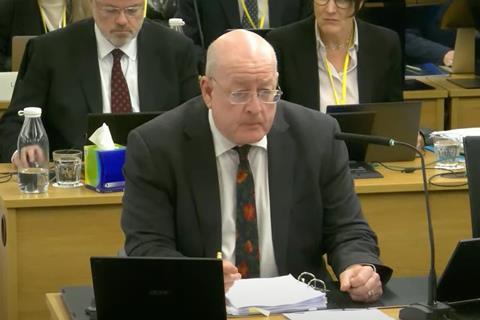
11.40am: Henry reminds the inquiry of how in-house solicitor Jarnail Singh had in his hand proof of the unreliability of Horizon on the Friday before the Misra trial started.
Henry continues: 'Had [Singh] and [other in-house solicitor] Rob Wilson done the right thing, no doubt Seema Misra's trial would have been brought to a conclusion on the Monday morning with the offering of no evidence. The right thing to do in 2010 was staring them in the face but they could not do the right thing because Seema Misra's case held the dam for the floodwaters of claimants whose lives had been destroyed by the Post Office's actions.'
Henry is cut off midway through a sentence by Williams who tells him his time is up. The inquiry goes to a break.
11.30am: The inquiry has now published all the closing statements. They can be found here: Closing Statements - 16 December 2024 | Post Office Horizon IT Inquiry.
11.25am: The culture infected the law. There were expectations. There were embedded commands disguised as questions... 'I need to say this' became the be-all-and-end-all of everything.
'The Post Office says "it is not our fault, we recruited the wrong people in [law firm] Cartwright King. We gave [external solicitor Andrew] Parsons too much responsibility". But the question is always why. Why did you pick such unsuitable advisers? Is it bad luck? Incompetence or a lack of integrity?' says Henry.
11.15am: Henry continues on the theme of the board and Post Office leaders guiding the legal team, albeit he says several of the lawyers involved were 'rogue'. 'The board and executive saw lawyers and legal reviews as tools for optics... they knew what was inside the box and they wanted to keep the lid on it, and the lawyers were part of the strategy.'
Henry goes on to say that this policy 'deprecated those who would put their professional obligations before their loyalty to the business.'
11am: Henry says the 'toxic' policy of containment of the Horizon issues was not just down to the lawyers. Instead, he says that lawyers acted in the way they did because it was mandated by the board.
'The lawyers were following the path that had been set for them by the chair and the executive.'
10.45am: On Misra (pictured below), who was pregnant when was jailed in 2010, Henry says she was treated as a 'scalp' which the Post Office had to secure at all costs. The inquiry has previously heard that lawyers were told about issues with Horizon just days before Misra's trial but did share this information with the defence team. Henry says she was a 'priceless' test case and as a result her freedom was 'stolen' in what was 'as appalling as anything [the inquiry] has witnessed'.
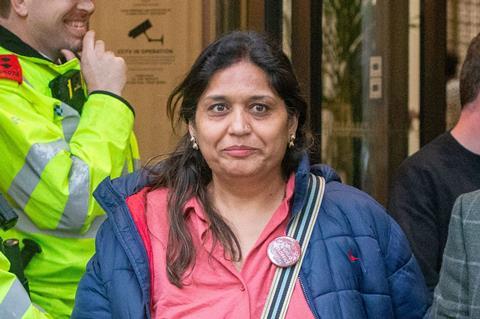
10.40am: Henry directly discusses the cases of Lee Castleton (pictured below) and Seema Misra. Castleton was bankrupted in 2006 after the Post Office pursued him through the civil courts for a purported £26,000 missing from his branch account. Castleton lost the case and was saddled with the Post Office's legal costs, which came to more than £300,000. Henry says the Post Office used a trick to reverse the burden of proof and make it impossible for Castleton to prove he was not responsible for shortfalls. This was done to 'ruin' him and his family and to deter others from challenging the organisation.
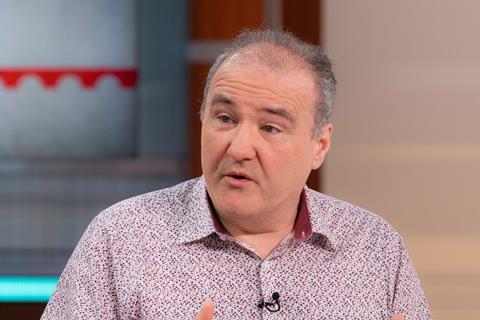
10.30am: Henry is not holding anything back in his criticism of the Post Office. He says those claimants seeking compensation without legal representation have been 'degraded, insulted and exploited in the most terrible fashion' with token payments for the destruction of their lives.
10.20am: Henry says the Post Office has not changed its spots and its culture remains the same, as proved by the handling of the compensation schemes in recent years. He says these over-legalistic schemes were 'cynically devised and brutally operated', forcing people to surrender because they could no longer face the battle.
10.15am: Henry directly references the Post Office lawyers, both in-house and external, saying they 'enforced this corporate psychopathy with ingenuity, ruthlessness, disregard for ethical norms and even deceit.'
10.10am: Henry describes the 'absurdity' that Horizon was infallible which set the scandal in motion, followed by the Post Office's repeated and false claims that the system was 'robust'. He says sub-postmasters were stigmatised by those in the organisation as 'trouble-makers, incompetents or dishonest' and that victims were 'silenced with a lie'.
Henry suggests it is a distraction to discuss whether those in charge knew about the problems: instead they had created the conditions that meant any such problems would never surface in what he describes as a 'modern form of tyranny'. He says that advisers to the Post Office treated those wrongly convicted with a 'culture of contempt, ridicule and even hatred'.
9.55am: Henry begins: 'The greatest horrors of the world, man's cruelty to man, are not created by monsters or misfortune but by those who claim to act in the name of good, enforcing a perverted vision of order that leaves no room for dissent.
'This tragedy is not about an IT system. Horizon did not destroy the innocent: the malignant culture of the Post Office did. The Post Office's inveterate contempt for the sub-postmasters, its corrosive prejudice against them, its desire for absolute control over them was an incubator for these terrible events.'
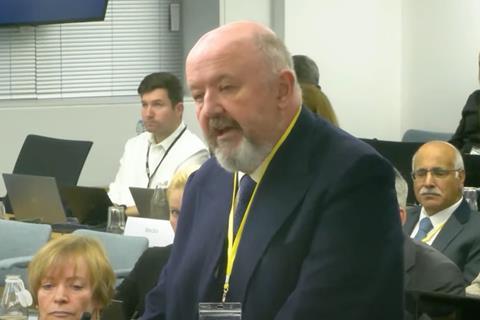
9.50pm: Williams explains how the next two days will work. Each core participant, which includes groups of sub-postmasters, the Post Office itself and individuals such as former chief executive Paula Vennells, will be given a strict hour in which to make closing statements.
Ed Henry KC, representing five individuals on behalf of Hodge Jones and Allen, is first in the batting order.
9.45am: Inquiry counsel Jason Beer KC gives a sense of the enormity of the inquiry, explaining that it has dealt with 2,214,858 pages of evidence, received 780 witness statements and heard evidence from 298 witnesses. He confirms the inquiry's legal team will not make any closing statement as such, but adds: 'I hope that we as your team have fulfilled the promise that we made at the start of the inquiry to you to not lose sight of the fact that the inquiry was not to look at a computer system but rather an investigation into the harm caused by people to people.'
9.35am: We begin, as we have so often during this inquiry, with some sad news as chair Sir Wyn Williams reports the news of the death of former sub-postmistress Margaret Boston. She was based at a Post Office in Rotherham for 25 years and saw it as her public duty to carry out the role.
She was a core participant in the inquiry and one of the 555 Bates litigation claimants. Williams states that her family said it was of some comfort that she received full compensation before she died.























